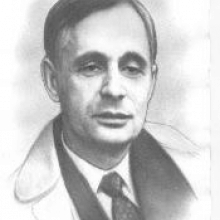Admoni Vladimir Grigorievich
Биография

A linguist, literary scholar, poet, prose writer and translator; an expert in the general theory of grammar, in the theoretical grammar of German, in the historic syntax of German, as well as in the German and Scandinavian literature, V. G. Admoni authored 30 books and over 200 articles and reviews.
Graduating from the Foreign Languages Department of the Leningrad Herzen Pedagogical Institute in 1930, A. taught at higher education institutions in Leningrad and headed (as of 1934) the German Language Chair. In 1939, he defended a Cand. of Science (Ph. D) thesis on Jean Paul Richter’s legacy, and in 1947, a Dr. of Philology thesis on Henrik Ibsen. In 1948, he was conferred the professor title.
In the winter of 1941-1942, A. served with the Political Directorate of the Leningrad Front to devise anti-Nazi propaganda materials. In March 1942, he was evacuated to Tashkent as a doctoral student of the World Literature Institute of the USSR Academy of Sciences. Returning to Leningrad, he resumed his teaching activities with the First Leningrad Pedagogical Institute of Foreign Languages and then, after a forced two-year break (when he was suspended from teaching, accused of “cosmopolitism”), at the Leningrad Pedagogical Institute. There, after its integration with the Herzen Pedagogical Institute in 1957, he headed the Chair of the Germanic Philology. As of 1960 and till his demise, A. was a senior researcher at the Leningrad Department of the Institute of Linguistics of the USSR Academy of Sciences (reorganized in 1991 into the RAS Institute for Linguistic Studies).
A. is a widely recognized authority in both Germanic studies and theoretical linguistics, with his works, mostly on the structure of German, effectively blending historic and systemic principles, quantitative and qualitative analyses of grammatical phenomena. He is known for development of a system of relations and a system of arrangement (the sphere of the means of syntactic units’ organization and distinction), for analyses of a vast linguistic evidence and broad generalizations over regularities in the historical processes of language change. He enjoys primacy in the development of theoretical premises for a field approach to grammar system studies.
A.’s first publication on German grammar appeared in 1934, followed by the 1935 article Struktura predlozheniya [The Sentence Structure] that laid the groundwork for a multi-aspect-dominant approach to grammatical analysis immediately leading to the idea of a field structure of grammatical system and its subsystems. His volume Vvedeniye v sintaksis sovremennogo nemetskogo yazyka [An Introduction into the Modern German Syntax] (1955) paved the way to a series of A.’s monographs on the German grammar, the general grammar theory and on the methodology of grammar studies. A.’s books in German, both translated from Russian and specifically written in German, brought him international recognition. The first was Der deutsche Sprachbau which enjoyed four editions in the USSR (1960-1986) and two editions in Germany (1970; 1982). Another four books as well as numerous articles were published in Germany. They addressed the grammar theory and the history/modern state of the grammatical system of German; in particular, Grundlagen der Grammatiktheorie (1971) was also published in 1995 in English.
Literary criticism, mostly addressing the history of the German and Scandinavian literatures and poetics, takes a significant place in A.’s legacy. He authored a number of chapters in the five-volume Istoriya nemetskoy literatury [History of the German Literature] (M., 1962-1976). His book Poyetika i deystvitelnost [Poetics and Reality] (L., 1975) is a review of the West-European and American literature of the XX century. A.’s monography Henrik Ibsen was published in 1990 in Germany.
A.’s scientific achievements earned high international recognition. He was elected a corresponding member of the Gottingen Academy of Sciences and a Doctor Honoris Causa of the Uppsala University (Sweden); he was awarded a Goethe Gold Medal and a K. Duden Prize and was a member of the Academic Council of the Mannheim German Language Institute.
Composing poetry since a young age, it was only in the 1970s that A. saw his poems in print. His first book of poems, Iz dolgoty dney [From the length of days] with an afterword by Academician D. Likhachov appeared in 1984, Poema polyota [The poem of flight] in 1990, and the collection of poems Zhizn naklonilas nado mnoy [Life bent over me], in 1993. Many of his poems, translated by A. into, or written in German, were published in Germany as a separate book, Die neue Menschlichkeit , in 1992.
Together with his wife, Prof. T. Silman, A. co-authored a large book of memoirs My Vspominayem [We recollect], published in 1993. A. published a range of poetic and prosaic translations from German and Scandinavian languages, with many of the translations co-authored with T. Silman. Over 10 years, A. chaired the Bureau of the Literary Translation Division, and was a member, of the Leningrad Writers’ Union Board.
A. spent a lot of time and effort on tutoring young researchers, with his postgraduate students preparing over 50 Ph.D dissertations.